Skool vs Facebook Group: Which is Better for Building Your Online Community?
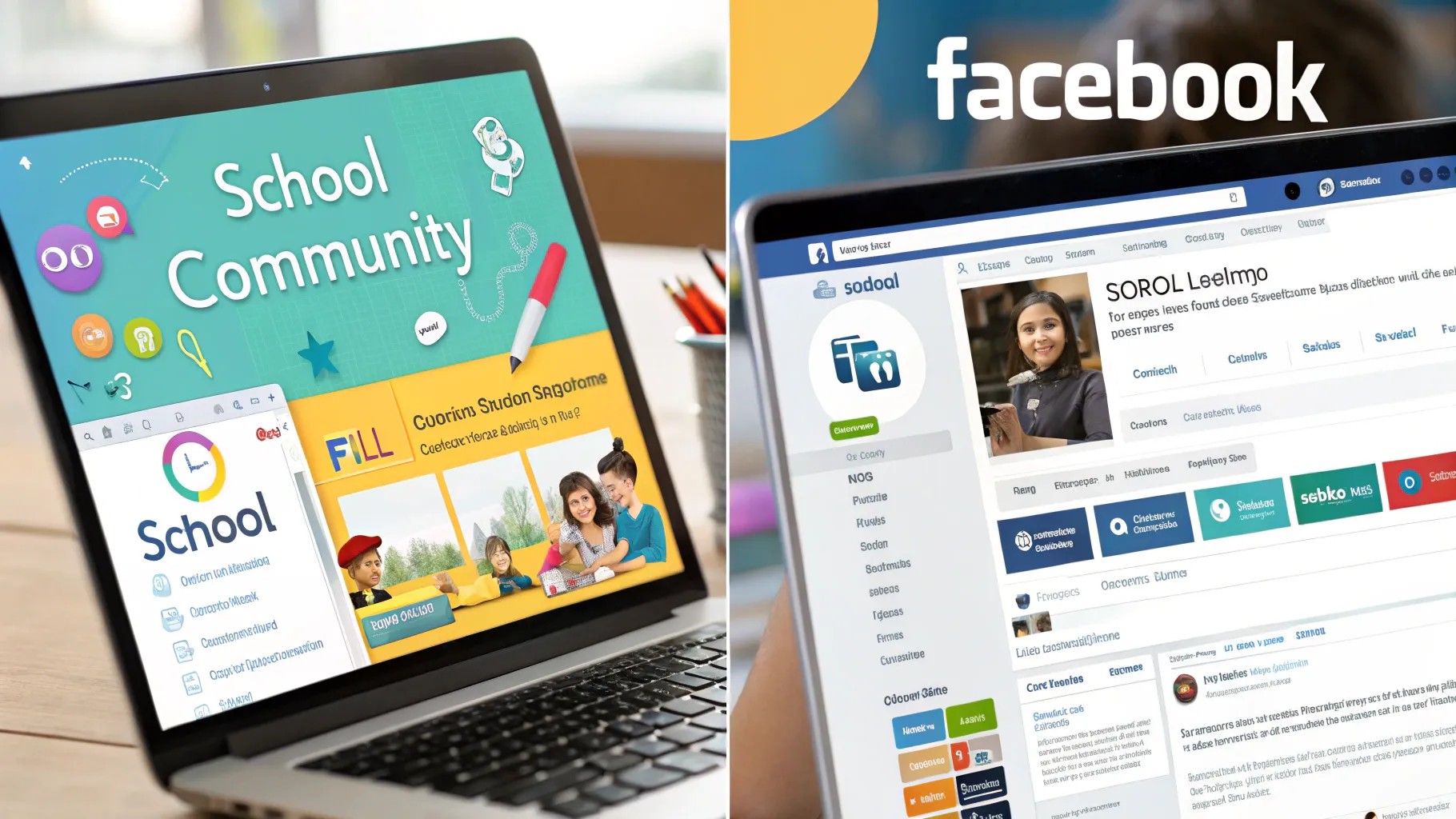
In today’s digital age, the opportunities for creating vibrant online communities have never been greater. With virtual connections flourishing every day, choosing the right platform to host and nurture your community is crucial. Two platforms often come up in this conversation: Skool and traditional Facebook groups. Each platform offers unique advantages, tailored tools, and distinct user experiences that cater to different types of communities — from educators and course creators to hobbyists and professional networks.
In this detailed guide, we’ll explore the key differences between Skool and Facebook groups based on features, user experience, community engagement, privacy, monetization options, and much more. By the end, you’ll have a clear understanding of which platform best aligns with your goals and community vision.
Note: If you’re interested in trying out Skool, you can sign up through my affiliate link here. It won’t cost you anything extra but will help support my work.
Table of Contents
- Step 1: Understanding the Unique Environment of Skool
- Step 2: Exploring the Versatility of Facebook Groups
- Step 3: Comparing Features and User Experience
- Step 4: Building Community Spirit and Engagement
- Step 5: Privacy and Focus — The Key Differences
- Step 6: Monetization and Audience Growth Opportunities
- Step 7: Subscription Model vs. Free Access
- Step 8: Technological and Functional Aspects
- Step 9: Making the Choice — Which Platform is Right for You?
- Frequently Asked Questions (FAQ)
- Conclusion
Step 1: Understanding the Unique Environment of Skool
Imagine a platform built specifically for educators, course creators, and coaches — a digital space where every feature is designed to enhance learning and foster growth. That’s exactly what Skool offers. Unlike generic social platforms, Skool is a dedicated learning community environment that feels like having your own online school.
What makes Skool stand out?
- Ad-free environment: Skool provides a distraction-free zone. There are no ads to pull your learners’ attention away, allowing them to focus deeply on the material.
- Built-in calendar: Keeping schedules organized is effortless with Skool’s integrated calendar, helping both creators and learners stay on track.
- Custom branding: You can personalize the space with your own branding, making it feel like a cozy, professional online classroom tailored to your community.
- Live streaming and course tools: Skool includes easy-to-use tools for creating courses and hosting live lessons, all within the same platform.
- Payment integration: A built-in payment system simplifies transactions, so you can manage subscriptions or course sales without juggling multiple tools.
- Intuitive user interface: Skool’s interface is straightforward and user-friendly, removing the common complexities found in other platforms.
All these features combine to create a purposeful, focused environment that supports not just content delivery but meaningful educational engagement. It feels like a digital campfire where learners gather to share knowledge and spark insightful discussions.
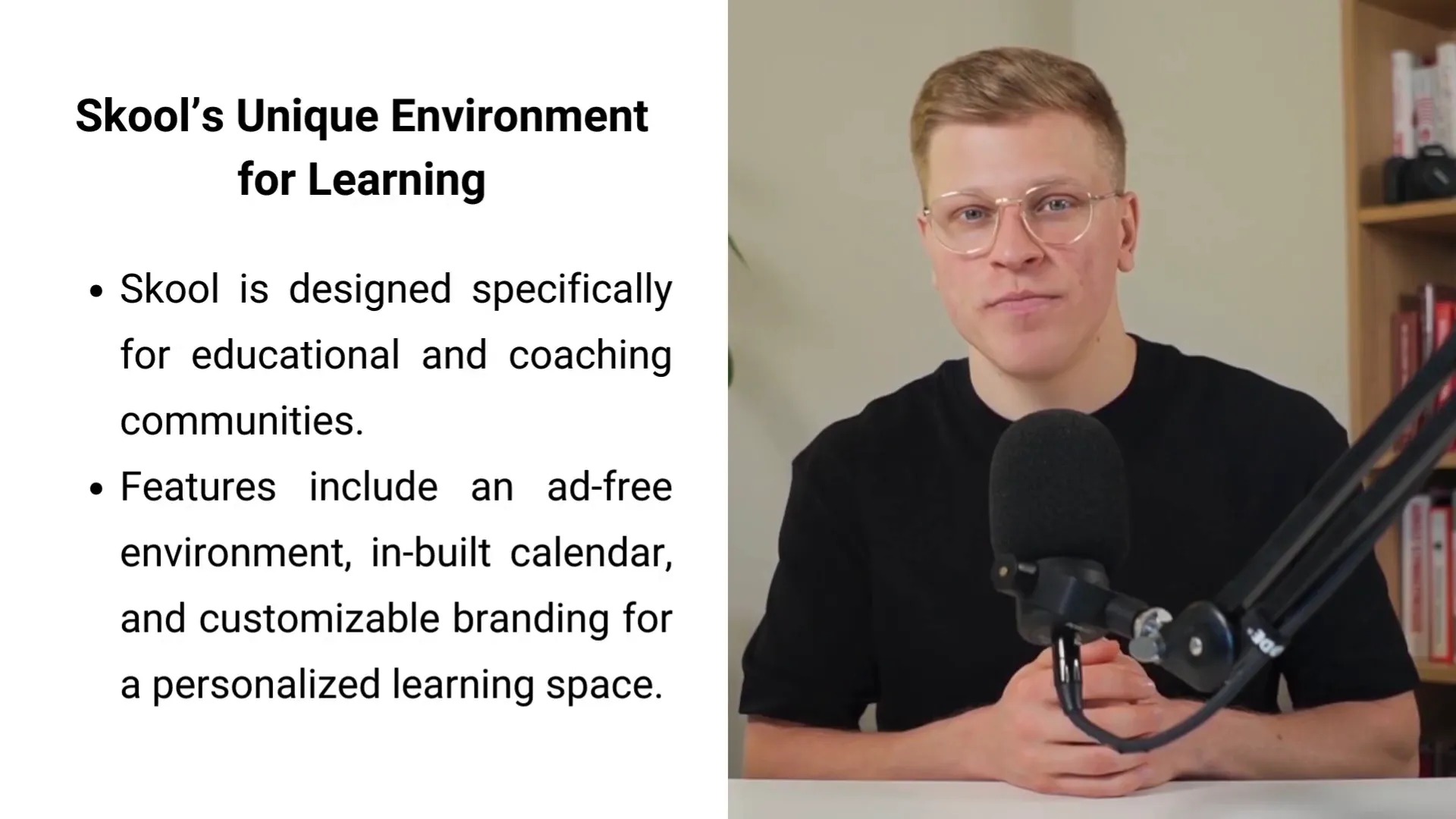
Step 2: Exploring the Versatility of Facebook Groups
On the other hand, Facebook groups are the classic, versatile option for online communities. They serve as bustling hubs where conversations on countless topics happen every day, from casual catch-ups to professional networking.
Facebook groups shine in their:
- Massive user base: With billions of Facebook users worldwide, your group has enormous potential to grow and reach diverse audiences.
- Flexible community types: Whether you’re rallying hobbyists, building a movement, or connecting professionals, Facebook groups adapt to your needs.
- Interactive features: Group chats, polls, file sharing, and events make it easy to engage members in dynamic ways.
- Free to create: Anyone can start a Facebook group without upfront costs, making it accessible for startups and new community builders.
Facebook groups act like a lively playground for community interaction. The energy is palpable, and the opportunities to spark conversations and build connections are virtually endless. However, this versatility sometimes comes with a trade-off — navigating the platform can feel overwhelming, especially for newcomers.
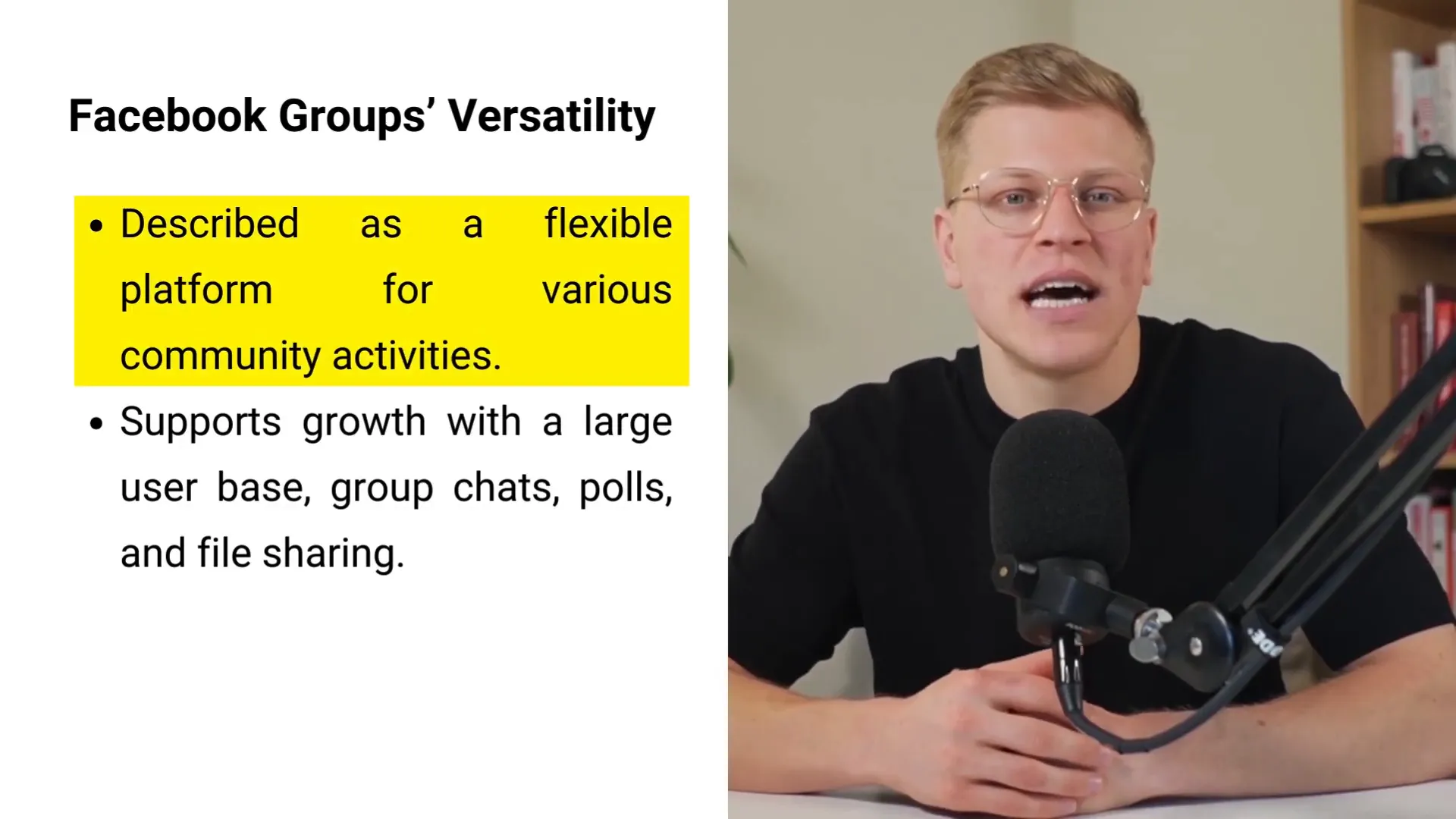
Step 3: Comparing Features and User Experience
When you dive into the nuts and bolts of these platforms, the differences become even clearer.
Skool’s Tailored Learning Experience
Every feature on Skool is crafted with education and engagement in mind. The platform’s live streaming capabilities allow for dynamic lessons that feel interactive and immersive. Course creation tools are designed to be intuitive, so you can focus on content rather than technical hurdles.
Moreover, Skool’s built-in payment system means you don’t have to integrate third-party tools or worry about complex setups. This streamlines administrative tasks and lets you spend more time nurturing your community.
Skool’s user interface is clean and simple, which is a blessing for both creators and learners. You won’t find yourself lost in endless menus or distracted by unrelated content.
Facebook Groups’ Broad but Complex Interface
Facebook groups offer a wide array of features, but the experience can sometimes feel like navigating a dense forest without a map. Between endless scrolls, notifications, and a cluttered interface, newcomers might find it daunting to get started.
While Facebook does provide useful tools such as event scheduling, polls, and chats, these features are not always seamlessly integrated with the group’s core functionality. This can make community management feel fragmented and occasionally overwhelming.
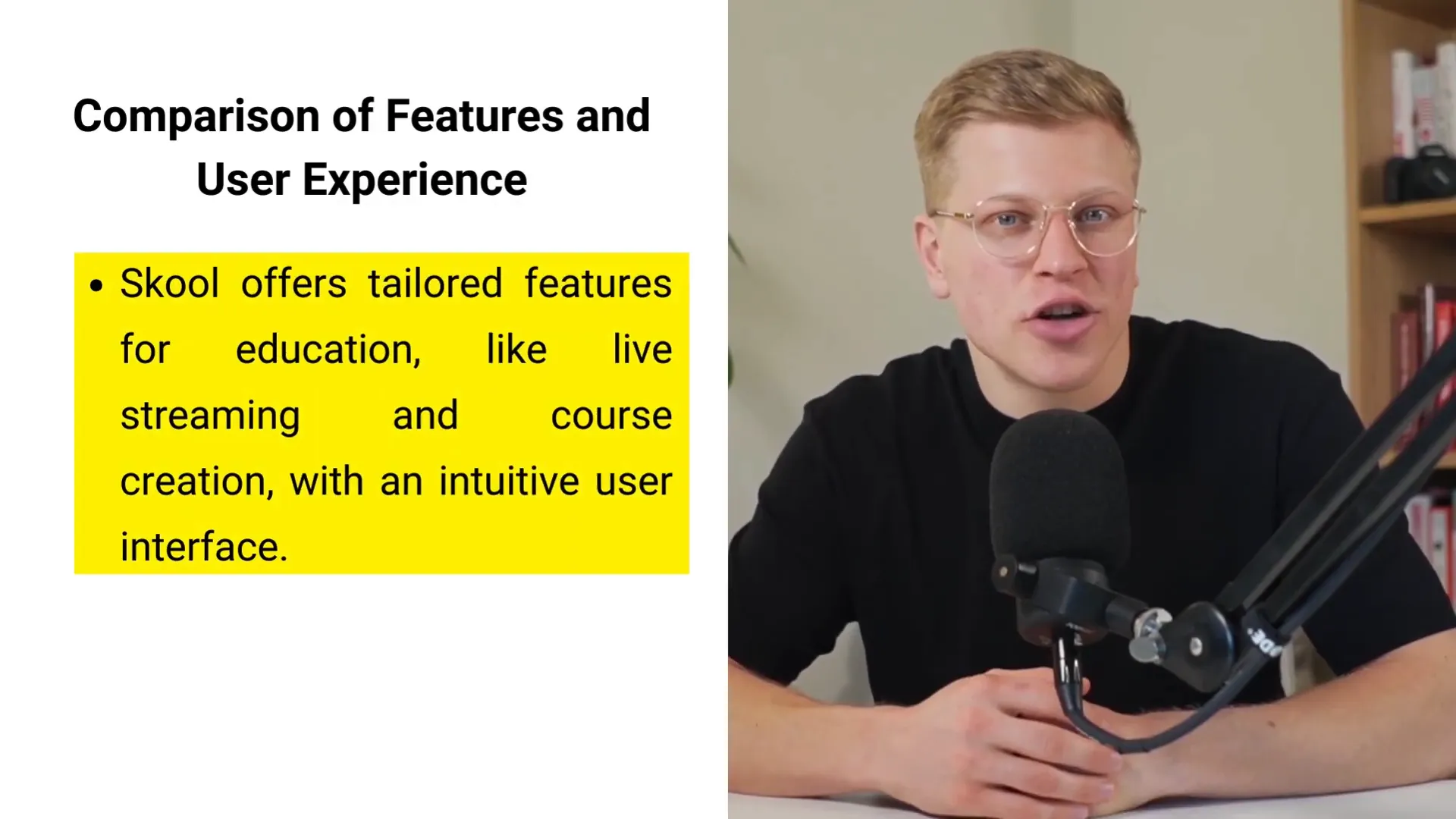
Step 4: Building Community Spirit and Engagement
At the heart of any online platform is its ability to foster genuine connections and active engagement. Both Skool and Facebook groups have their own approach to sparking community spirit.
Skool: Deep Educational Engagement
Skool encourages meaningful interactions through its live streaming and discussion forums. Imagine gathering around a digital campfire where lessons are shared openly, and conversations flow naturally. This environment nurtures a strong sense of community and enriches everyone’s understanding.
Facebook Groups: Dynamic and Broad Interaction
Facebook groups excel at facilitating lively, wide-ranging conversations. Their chat and event features are perfect for sparking dialogue on diverse topics, bringing people together with ease. The collective energy of the crowd in these groups can be exciting and motivating.
Whether your goal is focused education or simply bringing together like-minded individuals, both platforms offer unique ways to create lively, engaged communities.
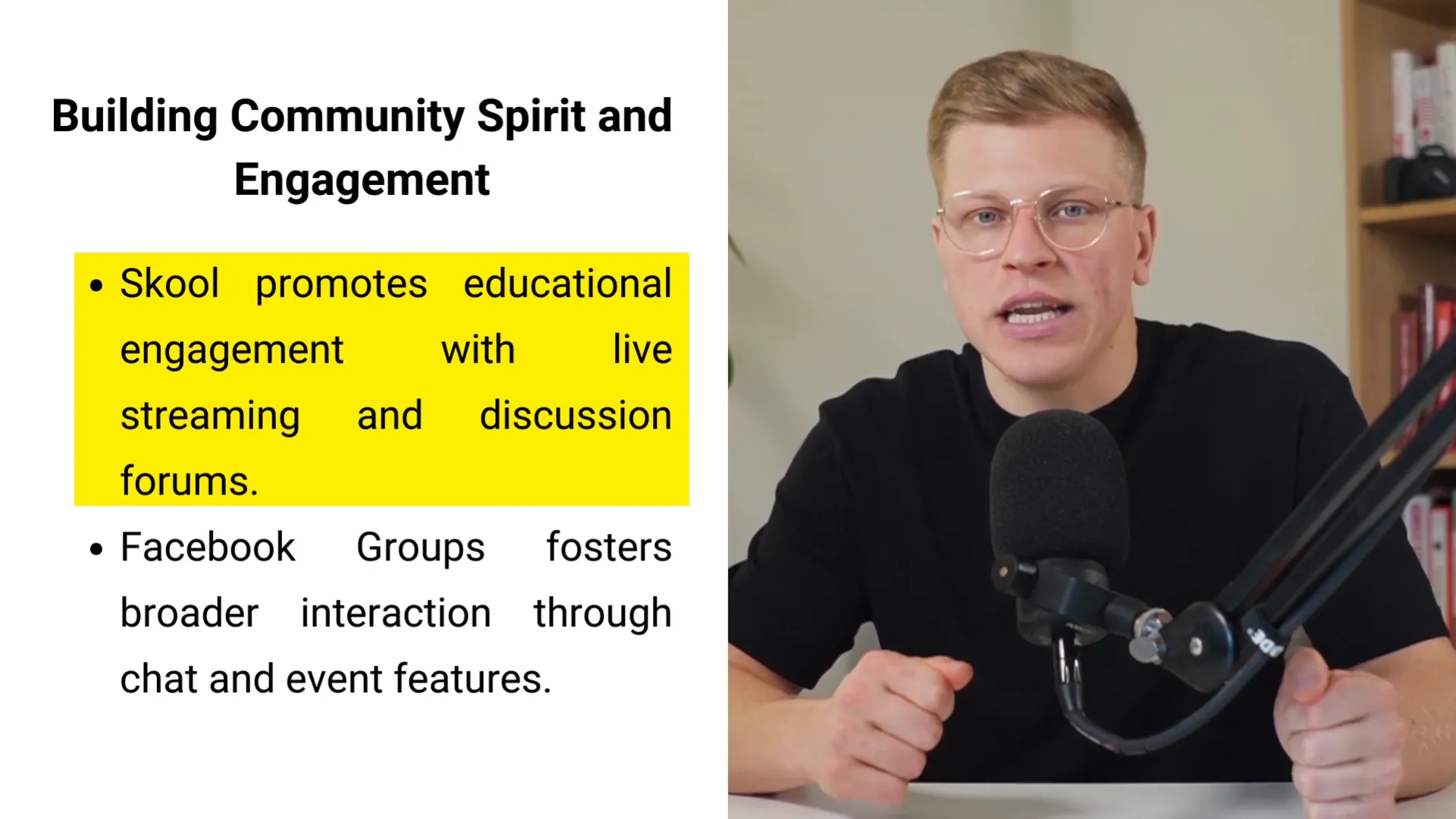
Step 5: Privacy and Focus — The Key Differences
Privacy and distraction management are critical considerations when choosing a platform.
Skool: Picture a quiet sanctuary dedicated solely to knowledge growth. Skool is designed to be a controlled and private learning environment, free from ads and external distractions. Educators can feel confident that their content remains protected and unaffected by outside influences. Furthermore, Skool prioritizes meaningful engagement without compromising user data privacy.
Facebook Groups: In contrast, Facebook groups operate within the larger Facebook ecosystem, which means users are subject to Facebook’s data policies and ad-driven model. While groups can be private or public, the environment is often more chaotic and less focused, which can detract from deep learning or meaningful connections.
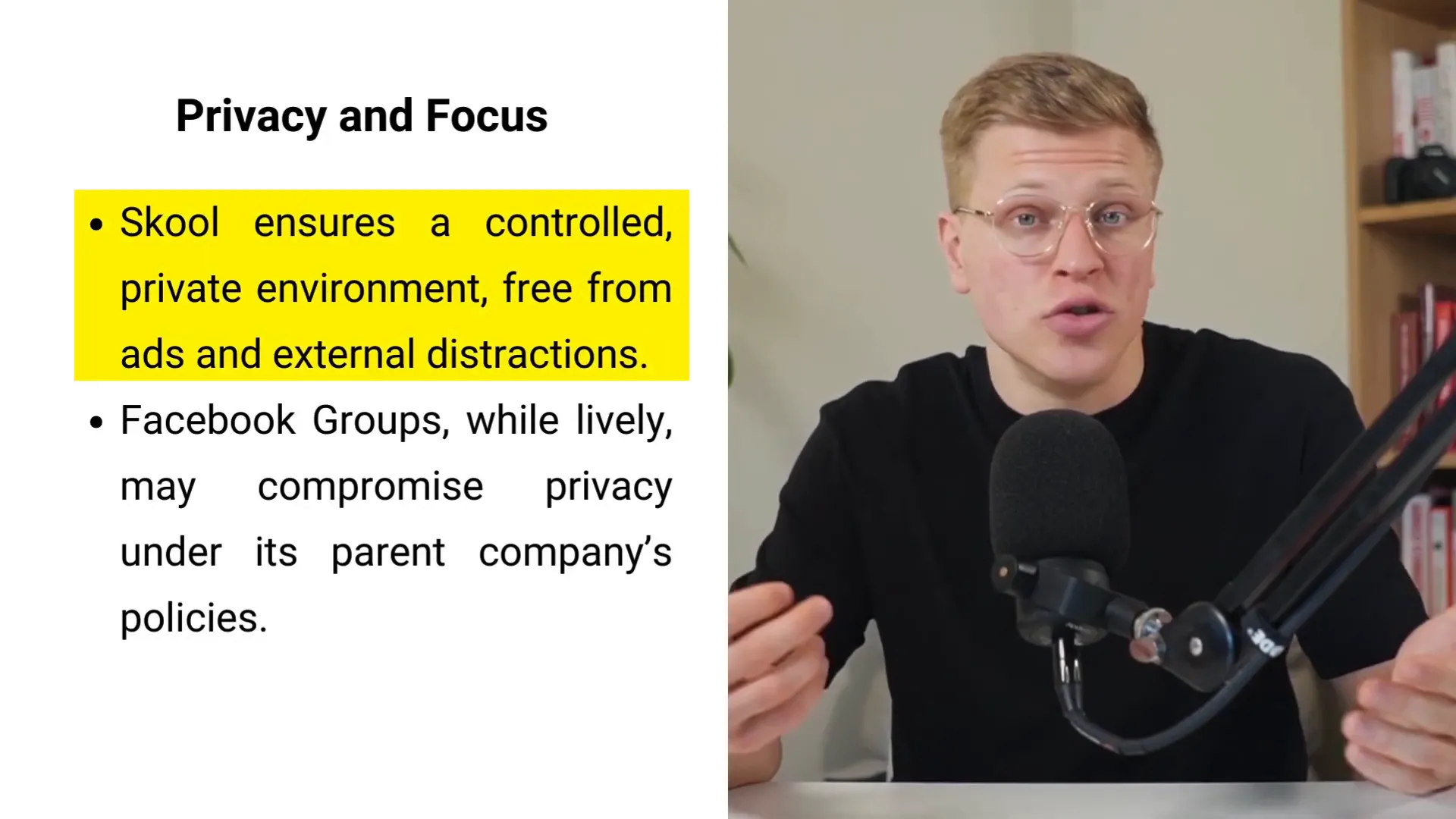
Step 6: Monetization and Audience Growth Opportunities
For many community builders, monetization is a key factor. Both platforms offer different paths to growing and earning from your community.
Monetizing with Skool
Skool is ideal for those who want to breathe life into their courses and educational content. It’s more than just a platform — it’s a partner in your educational journey.
- Subscriptions and paid courses: Skool supports monetization through subscriptions and course sales, making it easy to generate recurring income.
- Marketing tools: Tailored marketing tools help attract and convert prospective learners.
- Gamification integration: Learning on Skool can be gamified, turning students from passive receivers into active participants on a quest for knowledge.
- Seamless communication: Built-in tools keep motivation high and connections strong within your community.
Growing and Monetizing Facebook Groups
Facebook groups represent a bustling hub where networking and visibility are paramount.
- Huge audience potential: With Facebook’s vast user base, your group can reach millions.
- Free creation and promotion: Groups can be created and promoted without upfront costs, ideal for startups and visionaries.
- Advertising options: You can invest in targeted ads to boost visibility and attract members.
- Creative freedom: The only limits are your creativity and ability to engage members actively.
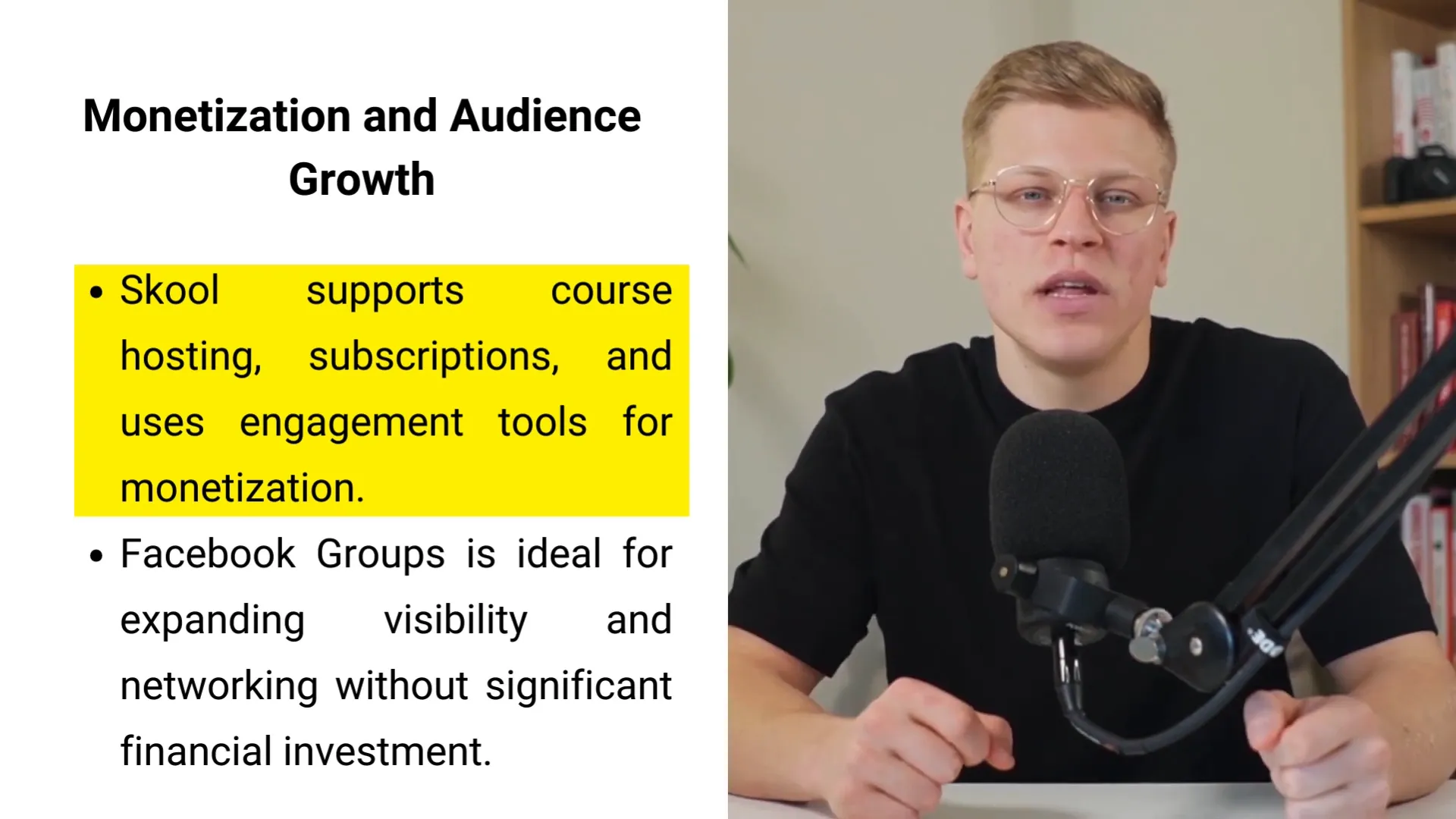
Step 7: Subscription Model vs. Free Access
Understanding the cost structure is essential for long-term planning.
Skool: Skool offers a straightforward subscription model. A single fee of $99 unlocks access to a suite of features designed specifically for educational content creators. This includes specialized video hosting, seamless app integration, and no hidden costs. The simplicity allows you to focus on community building without worrying about unexpected charges.
Facebook Groups: Facebook groups are free to create and participate in. However, if you want to enhance your group’s visibility, you can opt to invest in Facebook’s advertising platform. This gives you flexibility but requires additional budget and marketing know-how.
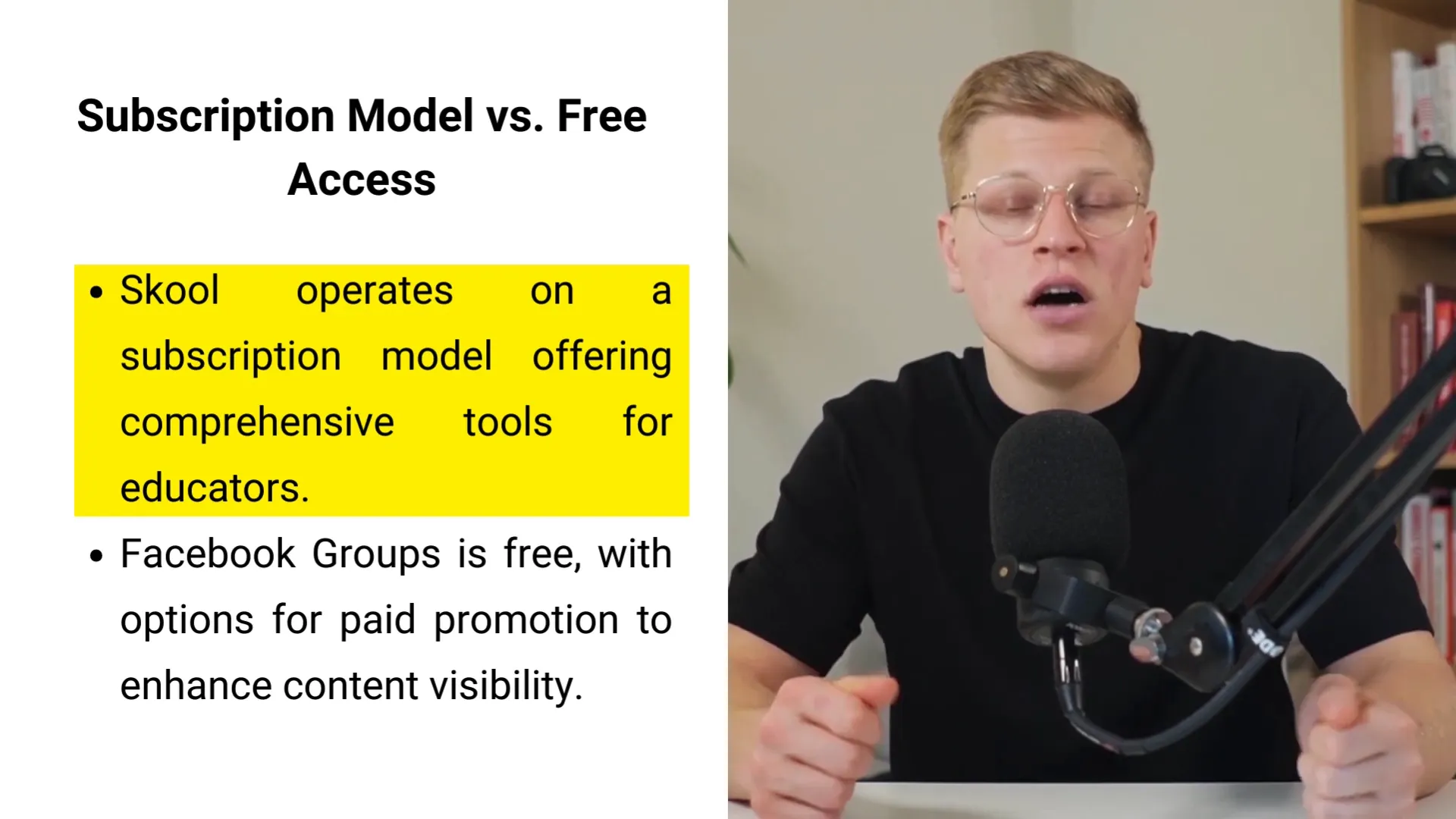
Step 8: Technological and Functional Aspects
Technological sophistication and usability can make or break the community-building experience.
Skool’s Technology: Skool’s app is a smooth, intuitive extension of its web platform, making mobile management a breeze. Its messaging system and video capabilities are purpose-built to meet the needs of educators and learners, ensuring seamless communication and content delivery.
Facebook Groups’ Technology: Facebook offers basic functionality that serves a broad spectrum of community types. While it covers many bases, it may lack the depth, customization, and specialized tools that creators focused on education or coaching might crave.
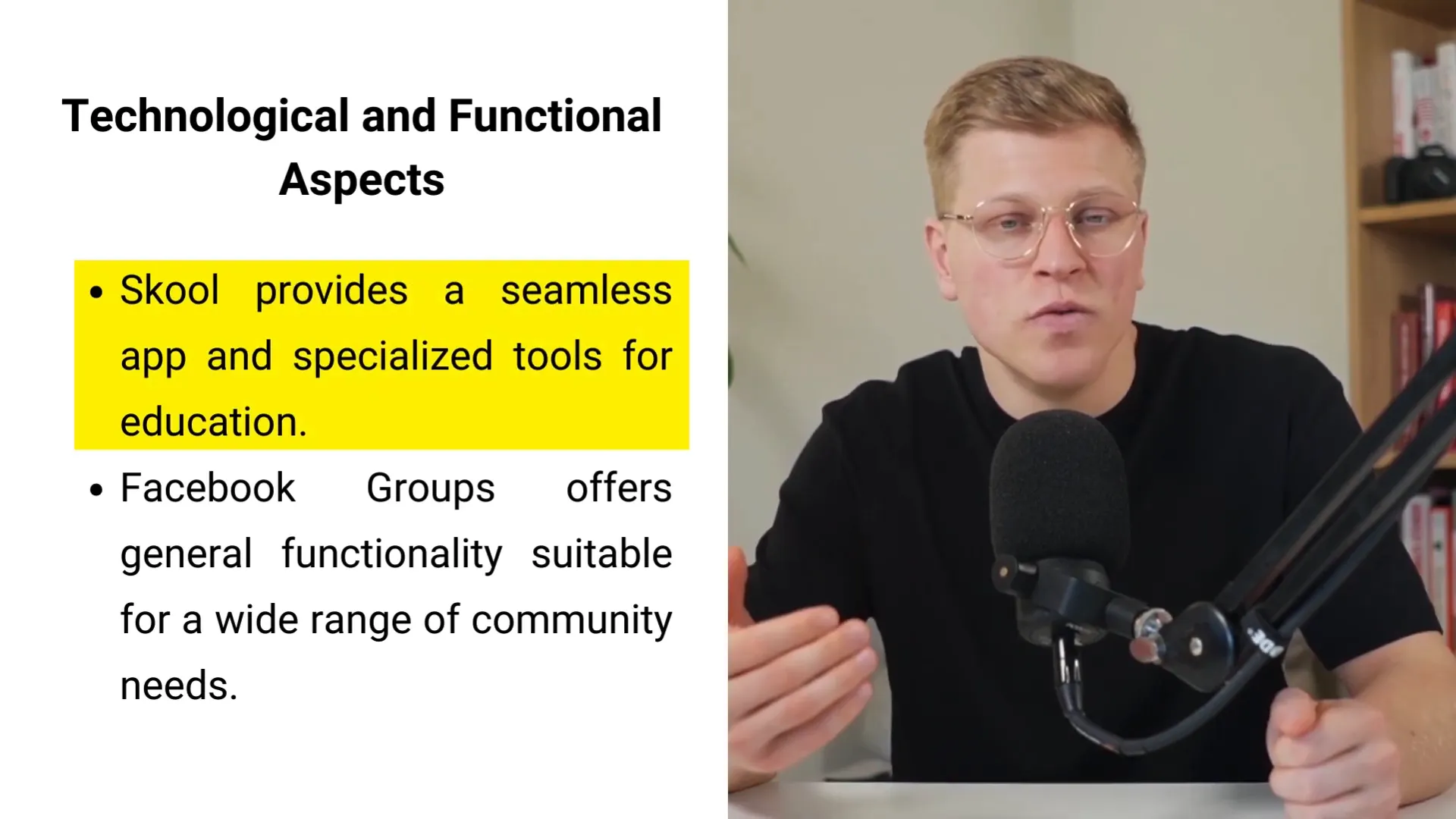
Step 9: Making the Choice — Which Platform is Right for You?
Ultimately, the decision between Skool and Facebook groups depends on your community’s specific needs and goals.
Here’s a quick summary to help you decide:
- Choose Skool if: You want a focused, ad-free educational platform with comprehensive tools for course creation, live streaming, and monetization. Skool is ideal for educators and coaches who want to build a private, distraction-free learning environment with robust engagement features.
- Choose Facebook Groups if: You want to tap into a massive, diverse audience and build a versatile community with free access. Facebook groups are great for broad reach, networking, and casual or professional interactions where flexibility and volume are priorities.
Personally, I use Skool because it offers a dedicated educational platform equipped with all the tools I need to create a focused, engaging community. However, Facebook groups remain a powerful option for many types of communities due to its vast user base and versatility.
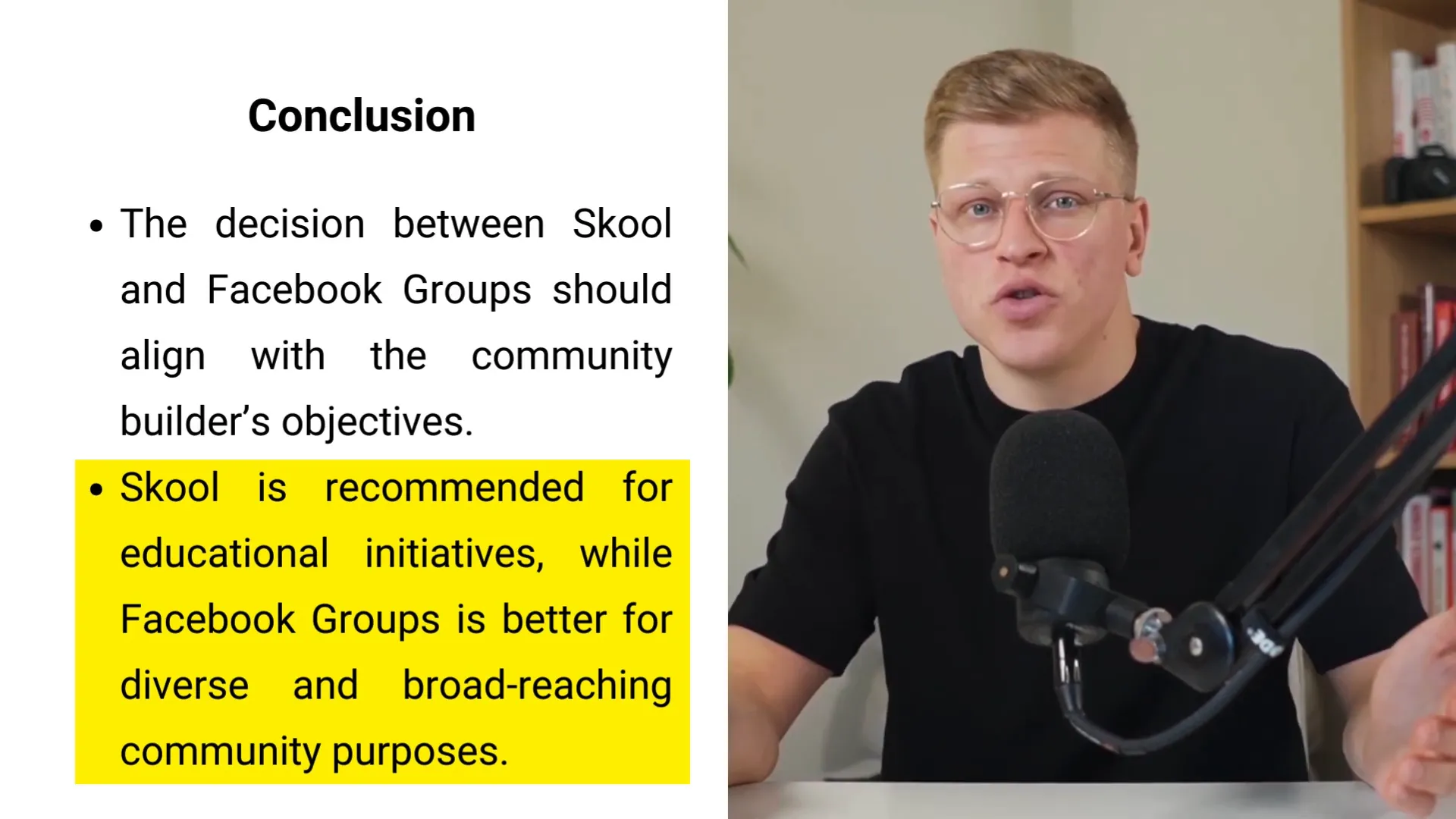
Frequently Asked Questions (FAQ)
1. Is Skool better than Facebook groups for education?
Yes, Skool is specifically designed for educational purposes, offering tools like live streaming, course management, and an ad-free environment, making it better suited for focused learning communities.
2. Can I monetize my community on Facebook groups?
While Facebook groups themselves don’t have built-in monetization features, you can monetize your community by promoting paid events, products, or services and using Facebook ads to grow your audience.
3. Does Skool offer a mobile app?
Yes, Skool has a mobile app that complements its web platform, allowing seamless management of your community and interaction on the go.
4. Are Facebook groups free to use?
Yes, creating and participating in Facebook groups is free. However, optional paid advertising can be used to boost group visibility.
5. How does Skool protect user privacy compared to Facebook?
Skool prioritizes privacy by providing an ad-free, controlled environment without data harvesting practices common on Facebook, offering a safer space for educators and learners.
6. Can I customize the look of my Skool community?
Yes, Skool allows you to apply your own branding, making your community feel personalized and professional.
7. What type of communities are best suited for Facebook groups?
Facebook groups are ideal for diverse community types, including hobbyists, professional networks, movements, and broad interest groups due to their flexibility and large user base.
8. Is there a free trial available for Skool?
Skool offers a subscription model; please check their official website or sign-up link for the latest trial offers or pricing details.
Conclusion
Choosing the right platform for your online community is a pivotal step toward building meaningful connections and achieving your goals. Skool vs Facebook Group is not just a comparison of tools but a decision about the kind of experience you want to create for your members.
Skool excels as a focused, educational platform that supports course creators and coaches with a suite of specialized features, a distraction-free environment, and monetization options. Facebook groups, meanwhile, offer unmatched versatility, a huge audience, and flexibility at no initial cost, making them suitable for a wide range of communities and purposes.
Evaluate your community’s needs carefully, consider the pros and cons outlined here, and choose the platform that aligns best with your vision. Whichever you choose, building an engaged, thriving community requires consistent effort, authentic interaction, and clear goals.
Ready to start your journey? Explore Skool through my affiliate link here and see how it can transform your educational community experience.
Thank you for reading, and here’s to your successful community building!
Ready to Build Your Skool Community?
Start your 14-day free trial today and turn your expertise into a thriving, profitable community that members love.
Start Free Trial